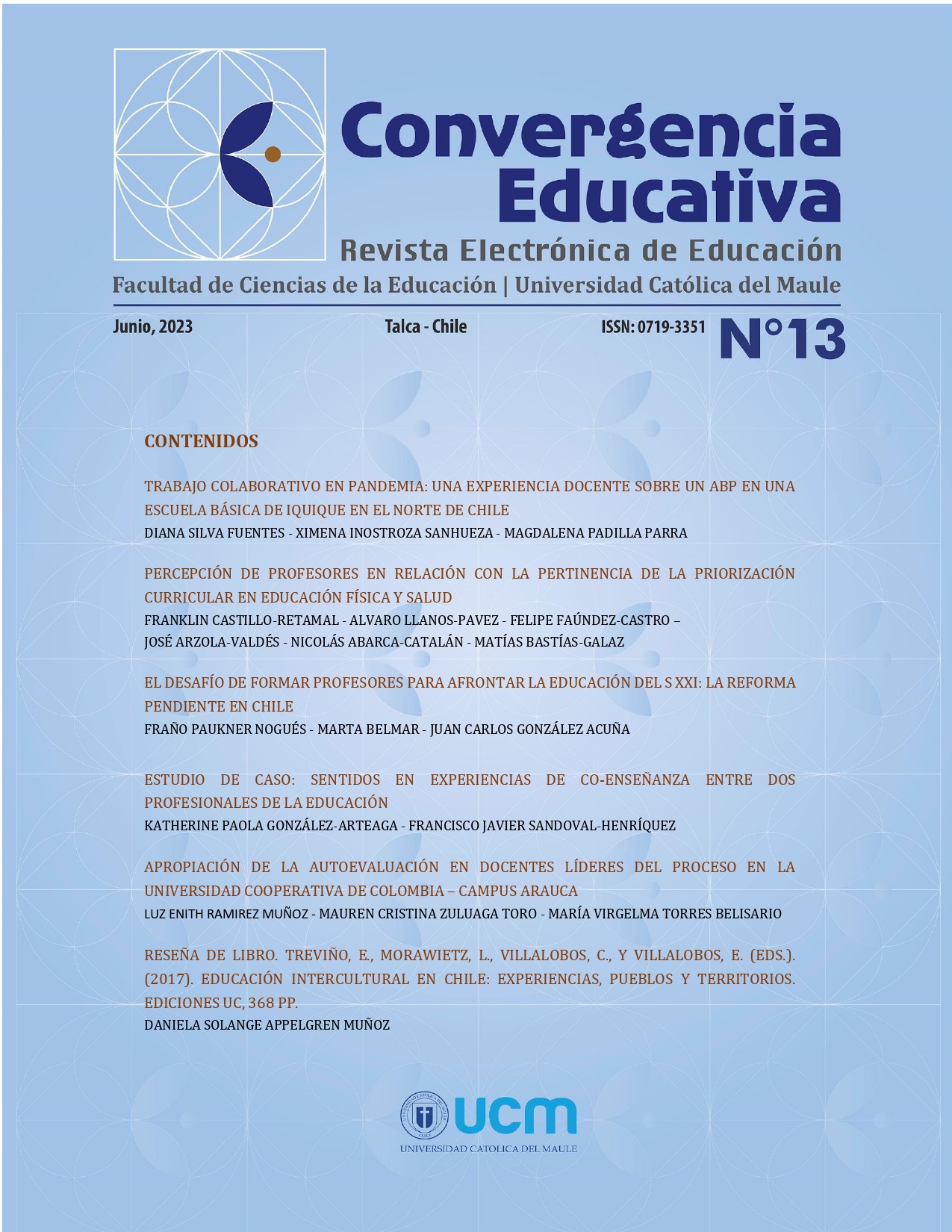Estudio de caso Sentidos en experiencias de co-enseñanza entre dos profesionales de la educación
Contenido principal del artículo
Resumen
Detalles del artículo
Aránguiz, J., Navarrete, K., & Soto, C. (2020). Enfoque de co-docencia que predomina en el aula común en tres establecimientos de la ciudad de Los Ángeles. [Tesis de grado, Universidad de Concepción]. http://repositorio.udec.cl/bitstream/11594/925/1/Aránguiz%20Acuña%20-%20Navarrete%20Bascuñan%20-%20Soto%20Roa.pdf
Arriagada, C., Jara, L., & Calzadilla, O. (2021). La co-enseñanza desde enfoques inclusivos para los equipos del Programa de Integración Escolar. Estudios pedagógicos (Valdivia), 47(1), 175-195. https://dx.doi.org/10.4067/S0718-07052021000100175
Ávila, C. (2021). Identificando barreras y facilitadores de las prácticas docentes de co-enseñanza en una escuela pública de Chile. CIMIE21: IX Congreso Internacional Multidisciplinar de Investigación Educativa, Barcelona. https://amieedu.org/actascimie21/wp-content/uploads/2022/02/Avila-Plaza.pdf
Bisquerra, R. (2014). Metodología de la investigación educativa. La Mullara S.A.
Carty, A., & Farrell, A. (2018). Co‐teaching in a mainstream post‐primary mathematics classroom: an evaluation of models of co‐teaching from the perspective of the teachers. Support for Learning, 33(2), 101-121. https://doi.org/10.1111/1467-9604.12198
Casserly, M., & Padden, A. (2018) Teachers’ views of co-teaching approaches in addressing pupils with special educational needs (SEN) in multi-grade classrooms. European Journal of Special Needs Education, 33(4), 555-571. https://doi.org/10.1080/08856257.2017.1386315
Castro, R. (2018). Configuración, movilidad y sentidos de los imaginarios sociales sobre educación inclusiva en profesores que conforman equipos de aula en la comuna de San Pedro de la Paz. [Tesis doctoral, Universidad Academia de Humanismo Cristiano]. http://bibliotecadigital.academia.cl/xmlui/handle/123456789/4384
Chitiyo, J., & Brinda, W. (2018). Teacher preparedness in the use of co-teaching in inclusive classrooms. Support for Learning, 33(1), 38-51. https://doi.org/10.1111/1467-9604.12190
Cook, L. (2004). Co-Teaching: Principles, Practices and Pragmatics. New Mexico Public Education Department. http://files.eric.ed.gov/fulltext/ED486454.pdf
Decreto 67 de 2018. Aprueba normas mínimas nacionales sobre evaluación, calificación y promoción y deroga los Decretos Exentos N° 511 de 1997, N° 112 de 1999 y N° 83 de 2001, todos del Ministerio de Educación. 31 de diciembre de 2018. https://www.bcn.cl/leychile/navegar?idNorma=1127255
Decreto 83 Exento de 2015 (30 de enero de 2015). Aprueba criterios y orientaciones de adecuación curricular para estudiantes con necesidades educativas especiales de educación parvularia y educación básica. 05 de febrero de 2015. https://www.bcn.cl/leychile/navegar?idNorma=1074511
Díaz, R., Droguett, A., Huentecura, C., Muñoz, M., & Piñeiro, J. (2022). Creencias y Concepciones sobre Co-Docencia con Profesores de Educación Diferencial Manifestadas por Futuros Profesores de Matemáticas. Revista latinoamericana de educación inclusiva, 16(1), 131-147. https://dx.doi.org/10.4067/S0718-73782022000100131
Figueroa, I., Sepúlveda, G., Soto, J., & Yáñez-Urbina, C. (2020). Coenseñanza entre docentes de educación general básica y educadoras diferenciales: Incidentes críticos de la práctica colaborativa en programas de integración educativa. Pensamiento educativo, 57(1), 1-15. https://dx.doi.org/10.7764/pel.57.1.2020.1
Friend, M., Cook, L., Hurley-Chamberlain, D., & Shamberger, C. (2010). Co-Teaching: An Illustration of the Complexity of Collaboration in Special Education. Journal of Educational and Psychological Consultation, 20(1), 9-27. https://doi.org/10.1080/10474410903535380
González, K. (2021). Co-enseñanza desde las relaciones de alteridad que se configuran en la experiencia pedagógica [Tesis de maestría, Universidad Católica de la Santísima Concepción].
Halliday, M. A. K. (1986). El lenguaje como semiótica social. Fondo de Cultural Económica.
Iacono, T., Landry, O., Garcia-Melgar, A., Spong, J., Hyett, N., Bagley, K., & McKinstry, C. (2021). A systematized review of co-teaching efficacy in enhancing inclusive education for students with disability. International Journal of Inclusive Education, 1-15. https://doi.org/10.1080/13603116.2021.1900423
Inostroza, F. (2021). Relaciones de poder en tareas de co-enseñanza: un estudio de casos entre pares de profesores en Chile. RIDE. Revista Iberoamericana para la Investigación y el Desarrollo Educativo, 11(22), e08. https://doi.org/10.23913/ride.v11i22.828
Jones, N., & Winters, M. A. (2022). Are two teachers better than one? The effect of co-teaching on students with and without disabilities. Journal of Human Resources, 0420-10834R3. https://doi.org/10.3368/jhr.0420-10834R3
Jortveit, M., & Bobo, V. (2022). Co-teaching that works special and general educators’ perspectives on collaboration. Teaching Education, 33(3), 286-300. https://doi.org/10.1080/10476210.2021.1895105
King-Sears, M. (2021). Secondary special education co-teachers in the United States and specialised reading instruction for adolescents with disabilities. Educational Review, 74(5), 942-956 https://doi.org/10.1080/00131911.2021.1872505
Kvale, S. (2011). Las entrevistas en investigación cualitativa. Ediciones Morata.
Lévinas, E. (2000). Ética e infinito. La Balsa de la Medusa.
Ley Nº 20.422 de 2010 . Establece normas sobre igualdad de oportunidades e inclusión social de personas con discapacidad. 03 de febrero de 2010. https://www.bcn.cl/leychile/navegar?idNorma=1010903&idParte=0
Ley Nº 20.845 de 2015. De inclusión escolar que regula la admisión de los y las estudiantes, elimina el financiamiento compartido y prohíbe el lucro en establecimientos educacionales que reciben aportes del estado. 08 de junio de 2015. https://www.bcn.cl/leychile/navegar?idNorma=1078172
Lindacher, T. (2020). Perceptions of regular and special education teachers of their own and their co-teacher’s instructional responsibilities in inclusive education: A case study. Improving Schools, 23(2), 140-158. https://doi.org/10.1177/1365480220906697
Lochner, W. W., Murawski, W. W., & Daley, J. T. (2019). The Effect of Co-teaching on Student Cognitive Engagement. Theory & Practice in Rural Education, 9(2), 6–19. https://doi.org/10.3776/tpre.2019.v9n2p6-19
Maldonado-Díaz, C. (2022). ¿Cómo se coenseña? Estudio de caso etnográfico en una escuela pública chilena. Perspectiva Educacional, 61(1), 100-126. https://dx.doi.org/10.4151/07189729-vol.61-iss.1-art.1217
Ministerio de Educación de Chile (2013). Orientaciones técnicas para programas de integración escolar (PIE). Santiago de Chile: Ministerio de Educación. https://especial.mineduc.cl/wpcontent/uploads/sites/31/2016/09/Orientaciones -PIE-2013-3.pdf
Pesonen, H., Rytivaara, A., Palmu, L., & Wallin, A. (2021). Teachers 'Stories on Sense of Belonging in Co-Teaching Relationship. Scandinavian Journal of Educational Research, 65(3), 425-436. https://doi.org/10.1080/00313831.2019.1705902
Pizana, R. F. (2022). Collective Efficacy and Co-Teaching Relationships in Inclusive Classrooms. International Journal of Multidisciplinary: Applied Business and Education Research, 3(9), 1812-1825. https://doi.org/10.11594/ijmaber.03.09.22
Ríos, T. (2013). La hermenéutica reflexiva en la investigación educacional y social. Universidad de Manizales.
Rytivaara, A., Pulkkinen, J., & de Bruin, C.L. (2019). Committing, engaging and negotiating: Teachers’ stories about creating shared spaces for co-teaching. Teaching and Teacher Education, 83, 225-235. https://doi.org/10.1016/j.tate.2019.04.013
Strogilos, V., King-Sears, M., Tragoulia, E., Voulagka, A., & Stefanidis, A. (2023). A meta-synthesis of co-teaching students with and without disabilities. Educational Research Review, 38, 100504. https://doi.org/10.1016/j.edurev.2022.100504
Weiss, M. P., & Rodgers, W. (2020). Instruction in Co-Taught Secondary Classrooms: An Exploratory Case Study in Algebra 1. Journal of the American Academy of Special Education Professionals, 119-133. https://digitalscholarship.unlv.edu/ecs_fac_articles/164/

Este obra está bajo una licencia de Creative Commons Reconocimiento-NoComercial-CompartirIgual 4.0 Internacional

